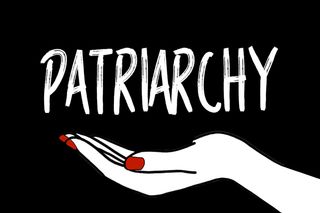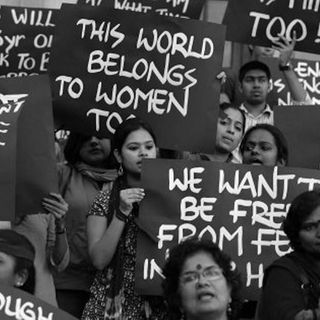
Women Discrediting the #MeToo Movement Are Probably Benefiting From the Status Quo
Even within a patriarchy, some women have more power than others.

While #MeToo has helped some men to open their eyes and take a stand against wrongs that have been indulged in the past (such as Amir Khan, who has withdrawn from producing Mogul after sexual assault allegations resurfaced against director Subhash Kapoor — albeit without being explicit about his rationale for nixing the film), many other men roll their eyes and think a “big deal” is being made out of nothing. Of course, it is inconvenient for many men to want to change, as woman’s demand for equality and respect rocks the boat and is a direct threat to the comforts of patriarchy. But they’re not the only ones decrying the movement; plenty of women are, too. And female complicity in propping up patriarchal structures that enable harassment and assault must be addressed as much as male behavior and complicity, if we’re ever to see positive social change.
Within a patriarchal system, it is possible for women to have varying levels of power. And recently, the news has focused on how woman in power have protected or made excuses for men in power who abuse their position by sexually harassing or exploiting woman in the work force. The apt example of Ghazala Wahab comes to mind: the journalist informed Asian Age’s then-bureau chief, Seema Mustafa, that she had been sexual assaulted and exploited by editor MJ Akbar. In response, Mustafa questioned “what is the big deal about going to a hotel room, we all did in those days,” normalizing the horror that Ghazala went through, and offering a “suck it up and shut up” defence of Akbar’s inexcusable behavior.
Within a patriarchal system, it is possible for women to have varying levels of power. Very often, Indian women are guilty of complicity in the crimes of men; they are often the very fuel by which female subjugation is fanned.
This reminds one of how Shoma Chaudhury of Tehelka was accused of “intimidation, character assassination and slander” in 2013 by the journalist who accused the magazine’s then-editor, Tarun Tejpal, of sexual assault, even after Chaudhury had received an emailed admission of guilt from Tejpal.
Implicit in both these woman’s words and actions is the internalized message of the patriarchy: that woman are expected to quietly endure and accommodate men’s abuse of power and accept mistreatment at work because of the unchallenged, ubiquitous belief that this is how the world works.
This attitude is not only perpetuated in a work context in India; even in the home environment, especially within joint family living arrangements, women with a degree of power often moralize, judge, admonish other less-empowered women, or even turn a blind eye to others’ subjugation.
Take, for instance, when a matriarch has reason to suspect that another woman or girl in the home is being abused, but chooses to ignore the problem. In my practice, I have come across mothers who tell their daughters they have “imagined [abuse]” and who advise “don’t make a scene” when told their daughters have been molested. Padma Lakshmi, who grew up in the US, told her parents about an uncle who made her touch his erect penis at her own home when she was 7 — and her parents responded by sending her to India for a year, in effect exiling her from her family. The message she got out of this was: “If you speak up, you will get cast out.” Nothing was said to her uncle about his inappropriate behavior, and by turning a blind eye to her daughter’s suffering, her mother was giving tacit permission for the cycle of abuse to continue, maybe with another young girl. Thus, very often, Indian women are guilty of complicity in the crimes of men; they are often the very fuel by which female subjugation is fanned.
Ignoring an abusive situation, or sweeping it under the table is one thing; some women blatantly side with the oppressor and actively further other women’s mistreatment. Take, for instance, the women who blindly believe their husbands or sons, and exonerate these men’s faults. Such are the mothers of the boys in Bihar who have been accused of sexual harassment in school and who beat up their female classmates for calling out and protesting their behavior. These mothers are guilty of condoning and encouraging such repugnant behavior by their sons.
The matriarch of the house allows toxic masculinity to thrive with her blessing, wielding the relative power she has to reinforce the powerlessness and abuse of other women.
Just as toxic is when women in positions of power act as though standing up for one’s right not to be harassed or mistreated, or standing up for another’s right, is unnecessary, prying or intrusive. A pop culture example comes from the Hindi TV serial Krishna Challi London, in which a woman stops her daughter-in-law from coming to the aid of another daughter-in-law being beaten by the son/husband, saying the first daughter-in-law should not “interfere.” The matriarch of the house subscribes to the popular belief, inherent in patriarchal societies, that women should not stand up for their or other’s rights, and instead passively accept what is doled out to them and their sisters. She allows toxic masculinity to thrive with her blessing, wielding the relative power she has to reinforce the powerlessness and abuse of other women.
There are many other ways this plays out. Mothers who do not approve of their daughters leaving abusive relationships in effect give free license to their sons-in-law to continue beating their daughters. A client once shared with me that she put up with physical and emotional abuse from her husband and in-laws for several years before begging her parents to allow her to leave her husband. Patriarchal norms — which hold that a woman’s value is determined by marriage to a man, that it is a woman’s responsibility to make a relationship work, that it is a woman’s place uphold the family honor – were so internalized by her parents, including her mother, that they told this woman to stick out the abuse and try harder; after all, they told her, what would her life be after becoming a divorcee?
These are extreme examples, but women’s participation in other women’s harassment, assault and subjugation manifests on subtle, everyday levels as well: woman who disparage other women, at home or the office, out of jealousy the others are doing better or getting more attention; women who belittle another woman’s promotion by flippantly assuming that the other woman has slept her way to the top – these are all commonplace reactions that serve only to strip other women of respect, power or reputation, and thereby strengthen the patriarchal structures that oppress women overall. A good example of this is the evil queen from Snow White who wants to be the fairest of them all, as if there’s only room for one beautiful — or credible, or accomplished, or heard — woman.
It is surprising to see how many women belittle other women for speaking up about #MeToo, how many question the others’ integrity, and doubt their accounts on technicalities.
Currently, this is most evidence within the #MeToo movement: It is surprising to see how many women belittle other women for speaking up, how many question the others’ integrity, and doubt their accounts on technicalities like the number of years that have passed since their harassment or assault. This suspicion of another women’s integrity and motives needs to stop. It takes great courage to stand up and admit that one has been raped, even years later; the sad fact is that many woman do not mention their assault when it happens because they fear being disbelieved or shamed. By disbelieving and shaming them, other woman are reinforcing the social forces that facilitate male dominance and encourage female silence and suffering — not to mention denying abused women the possibility to make peace with a traumatized part of their existence.
All this undermining of other woman can only change on a micro level, in our personal interactions, and it has much to do with how we bring up the next generation. We cannot just blame men for the mistreatment of woman, but must also hold ourselves accountable when we find ourselves perpetuating the silencing, shaming, oppression and abuse of other women. We can’t pass this down to the next generation. We must think long and hard about what kind of role models we want to be for our daughters and sons, with regards to equality. We also on a familial and social level need to question our fathers, brothers, husbands, colleagues and friends for how they could be perpetuating such damaging, sexist notions as well. That involves educating both men and woman about how they can advance gender equality, and calling them both out when they fail. Men, as a whole, have a lot of work to do in rethinking their entitlement to respect, power and yes, even sexual access. But so do women.
Got feelings about #MeTooIndia? Let them out by taking our survey.
Arya Punj Timblo is a professionally trained and practicing adult and child psychotherapist who has spent 10 years specializing in child psychology and 12 years working with adults in therapy. She holds a Master's and Specialization Degree in Psychotherapy and Counselling from the prestigious Regent's College in London and has worked in London, Mumbai and Goa as a therapist as well as a lecturer.
Related


#MeToo Has Unleashed Women’s Pent Up Rage, At Last
